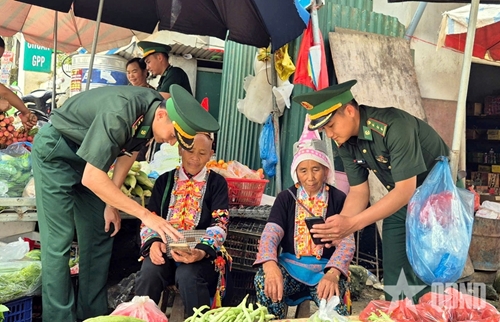At the beginning of 2025, the Party Committee of the border post issued a special resolution to enhance the effectiveness of Project 1371, along with a detailed implementation plan tailored to each village and community, focusing on high-risk areas and vulnerable groups susceptible to legal violations. The unit pro-actively compiled communication materials and outlines targeting key issues. Officers were trained in legal communications skills and assigned responsibilities based on their qualifications, knowledge about designated areas, and proficiency in ethnic minority languages. Each officer was tasked with delivering concise, easy-to-understand, and memorable legal education on designated topics.
    |
 |
|
Locals instructed on how to scan QR codes to access legal documents, search administrative procedures, and use online public services. |
The unit has creatively implemented four outstanding models. Apart from setting up an anonymous email for reporting crimes and illegal border crossings, the unit has created leaflets, brochures, banners, and posters on the Law on Vietnam Border Guard and its guiding documents, the “border lesson” model, and fostered the application of information technology to law dissemination among the public.
According Deputy Political Commissar of Vang Ma Chai Border Post Senior Captain Nguyen Duy Khanh, in addition to the printed materials distributed annually by the Lai Chau Border Guard Command, since February 2025, the unit has developed and distributed over 350 leaflets, brochures, banners, and posters on the Law on Vietnam Border Guard and related documents. The materials are brief, accessible, and easy to understand, and have been shared with local residents, agencies, and units. Through the "Anonymous email" model, people can report crime or security issues without visiting the border post. They can also access information on the Law on Vietnam Border Guard and other legal documents related to border management.
Under the model “Application of IT to law dissemination,” the unit has established a team of instructors to promote digital transformation and the movement “Digital Literacy for All.” They regularly update content and produce short, engaging law education videos shared via fan pages and Zalo groups. Citizens are guided to scan QR codes to access legal documents, search for administrative procedures, and use online public services.
The unit has launched the “Digital Literacy for All” campaign with the participation of over 40 officers and soldiers, and installed 17 QR code stations across local villages.
In addition, through the “Border lesson” model, the Border Post has not only visited schools, but also conducted field sessions at border markers to provide teachers and students with hands-on law education. These sessions covered topics related to national sovereignty, border security, the history and traditions of the Border Guard force, and relevant legal knowledge.
Moreover, Vang Ma Chai Border Post has established Zalo groups connecting border officers with village heads and residents. These groups are used to share legal information through relatable videos and images, tailored to the language and education level of ethnic minority communities. As a result, public legal awareness has improved significantly. The unit has received 32 public reports, including 14 highly valuable ones that have greatly aided in combating crime along the border.
These outcomes clearly demonstrate the pivotal role of the border guards in law dissemination at the grassroots level. In the coming time, Vang Ma Chai Border Post will continue to effectively implement Project 1371, with a focus on training to raise skills of orators at the grassroots level. The unit will further harness digital transformation and the “Digital Literacy for All” movement to expand law education efforts among border officers and local communities. These initiatives contribute to building a strong all-people national defense posture combine with a strong people’s security foundation.
Translated by Tran Hoai